Thursday, September 30, 2010
Gourmet Slaughterfest

The great Anthony Bourdain has something to add to his resume: graphic novelist.
From the piece in the Guardian...
"It's about ultraviolent food nerds. It's a gourmet slaughterfest, sort of like Fistful of Dollars meets Eat Drink Man Woman," he told the Omaha World Herald. In another interview, he described the comic as a combination of Kurosawa's 19th-century Japanese gangster film Yojimbo, Big Night, the story of two Italian brothers starting a restaurant in New Jersey in the 1950s, and Danish film Babette's Feast, in which a Parisian refugee plans a culinary banquet to thank the twin sisters who took her in. "[Get Gyro is] an ultraviolent slaughterfest over culinary arcana," said Bourdain.
The move isn't Bourdain's first foray into fiction: he is also the author of a handful of crime novels, including Gone Bamboo, "a feast of murder, hitmen, and the hitwomen they love", Bone in the Throat, about a junior chef who "unwittingly finds himself a partner in big-time crime", and The Bobby Gold Stories, as well as his non-fiction books. "The next book will be a crime novel, just to take a break from writing and talking about myself. I think that will be a healthy departure," he told the Omaha World Herald. "It's displaced New Yorkers in the Caribbean doing bad things to each other. Food will be involved."
Here's some of Bourdain traveling to Istanbul on "No Reservations":
The Ben Folds/Nick Hornby Collaboration
Wednesday, September 29, 2010
John Updike on Ted Williams
The Reader's Almanac has a story about John Updike's childhood hero.
Here's an interview of Williams later in life:
Old Greek Manuscripts - Online

The AP is reporting that the British Library is putting ancient Greek manuscripts online for all to see.
From the story...
The British Library said Monday that it was making more than a quarter of its 1,000 volume-strong collection of handwritten Greek texts available online free of charge, something curators there hope will be a boon to historians, biblical scholars and students of classical Greece alike.
Although the manuscripts — highlights of which include a famous collection of Aesopic fables discovered on Mount Athos in 1842 — have long been available to scholars who made the trip to the British Library's reading rooms, curator Scot McKendrick said their posting to the web was opening antiquity to the entire world.
McKendrick said that London could be an expensive place to spend time poring over the Greek texts' tiny, faded script or picking through hundreds of pages of parchment.
The Forked Path - Childhood, Death and the Choose Your Own Adventure

Do you recall with fondness those Choose Your Own Adventure books of your youth? There's a long discussion of them, here.
From the piece...
In the summer of 1988 my family moved across Orlando to a new home in a new neighborhood. When I entered third grade a few months later, it was with more than a little anxiety- I didn’t have any friends, didn’t know the school or the neighborhood at all. But I soon found compatriots, including a sandy-haired boy named Chris M., who would end up being my best friend for the rest of elementary school. And Chris had an inheritance.
The books were a gift to him from his older sister’s boyfriend- a box full of Choose Your Own Adventures from a few years earlier. We poured over them, relishing the illustrations, the variety of settings and the sometimes lurid titles and subject matter. But what we loved most was the central, binding concept- the branching paths. The feeling it gave of inhabiting someone else’s skin, of living a new situation and being able to explore it in relative safety.
PR for the PRC

Ever wonder what it would be like to be a speed typist for China's Ministry of Propaganda? N+1 has what you seek.
From the piece...
During the 2008 Olympics in Beijing, I worked as a speed typist for the Chinese Ministry of Propaganda. It was my job to type, in English, everything that was said during an endless blur of press conferences where the Middle Kingdom celebrated its logistical triumphs. For the six months leading up to the closing ceremonies, I took my place at the back of cushy hotel ballrooms and chilly glass conference halls. I sat at tables covered with peach linens and drank from glasses of water provided by gloved attendants. I slogged through conferences on stadium construction, on feeding the athletes, on the zigzag path of the Olympic torch. The reporters slouched; the officials droned; the translators whirred. Subjects varied, but the theme never wavered: I was transcribing traces of China’s Rise, delivering ascendance-evidence to an awestruck world. Some might have considered it ethically fraught to shill for an organization best known for driving tanks over students. I thought it was wonderful. I felt like I was at the center of the world, the spot where all eyes were turning. Though a humble conduit for bureaucratic cant, I embraced what seemed like proximity to power. A sentence I typed could end up in a Sorbonne journal, a Thai weekly, the New York Times. There was a cluster of video cameras at the back of every room. Once, a reporter friend nudged me. “Look,” he said. “We’re on TV in Russia.”
My transcripts were destined for china.org.cn, a site run by the Propaganda Ministry’s internet wing—the China Internet Information Center. For all its Orwellian potential, china.org.cn pursued a mandate similar to that of a North American chamber of commerce. No success went unheralded: the launch of a broadcast satellite, a donation made by Jackie Chan, the creation of a baseball league for the children of migrant workers. My transcripts provided easy copy for the 10,000 journalists who swanned into the country, hungry for quotes from government sources that might help clinch a story on what everyone agreed was a breath-taking Rise.
While I didn’t experience censorship as it’s shown in the movies—the black sharpie, the page torn from the record—I did experience a casual tyranny.
Tuesday, September 28, 2010
Tragedy at the Virginia Quarterly Review

The suicide of its managing editor has been blamed on workplace bullying. New details suggest the real story is much more complicated. Slate has more, here.
From the piece...
What does it mean to be a workplace bully? For kids, bullying is defined as repeated acts of verbal or physical abuse in a situation where there's a power imbalance between the bully and the bullied. But in the workplace, there is almost always a hierarchy; power imbalances are necessarily part of the equation. That doesn't mean bad behavior can't be policed. Sexual harassment suits do just that. But bosses and employees aren't peers the way school kids are. The leaders of companies and departments have to dictate rules and give orders and occasionally reprimand employees who are falling short on the job—they have to be bossy. It's possible to imagine a scenario in which a boss (or a group of co-workers) deliberately persecutes an employee—sabotaging his work, playing nasty pranks. But is every demanding, gruff boss a bully? Where is the line between mismanagement and harassment? And can a boss ever be held responsible for an employee's decision to kill himself?
A closer look at what happened at VQR, informed by conversations with Genoways and most of his colleagues and by examining internal e-mails sent in the run-up to Morrissey's death, suggests that while the VQR staff was unhappy with their boss, bullying may not be the right label for his behavior. The accusation that Genoways is to blame for Morrissey's suicide is even more questionable. Genoways has been branded as a workplace bully in part because a small band of advocates, which includes Gary Namie, saw in Morrissey's death an opportunity to spotlight their cause and jumped on it. In contrast to the black-and-white story of villainy they've promoted, what happened at VQR is complicated, and several key details have not yet been told.
Beware of the Book
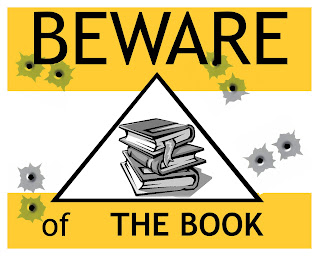
Are you enjoying 2010's Banned Books Week? Read something thrilling, my friends. Warp your minds!
The New York Times offers up ten ways to celebrate!
The Guardian highlights the top ten most challenged titles.
Yahoo News presents 10 books that were surprisingly banned (think: the dictionary).
Flavorwire takes a look at the absurd logic behind banning some of our most beloved books.
The Guardian has a story about building bridges with the book banners.
The Huffington Post takes us to the movies with 15 iconic films based on banned books.
The Huffington Post also takes note of 10 frequently banned graphic novels.
The Independent highlights some books that perhaps SHOULDN'T be stocked on library shelves.
How is the Pentagon celebrating Banned Books Week? With a book burn.
Finally:
The Dungeon Master

The marvelously talented Sam Lipstye has a short story published in the New Yorker. Enjoy The Dungeon Master.
It begins...
The Dungeon Master has detention. We wait at his house by the county road. The Dungeon Master’s little brother Marco puts out corn chips and orange soda.
Marco is a paladin. He fights for the glory of Christ. Marco has been many paladins since winter break. They are all named Valentine, and the Dungeon Master makes certain they die with the least possible amount of dignity.
It’s painful enough when he rolls the dice, announces that a drunken orc has unspooled some Valentine’s guts for sport. Worse are the silly accidents. One Valentine tripped on a floor plank and cracked his head on a mead bucket. He died of trauma in the stable.
“Take it!” the Dungeon Master said that time. Spit sprayed over the top of his laminated screen. “Eat your fate,” he said. “Your thread just got the snippo!”
The Dungeon Master has a secret language that we don’t quite understand. They say he’s been treated for it.
Whenever the Dungeon Master kills another Valentine, Marco runs off and cries to their father. Dr. Varelli nudges his son back into the study, sticks his bushy head in the door, says, “Play nice, my beautiful puppies.”
“Father,” the Dungeon Master will say, “stay the fuck out of my mind realm.”
“I honor your wish, my beauty.”
For more on Lipsyte, the Paris Review recently interviewed him, here.
From that piece...
A lot of young indie writers who are published by small presses look up to you as an example. I was with some of them the other night, and I heard one say, “Sam Lipsyte is the only writer who has made it from the small presses to the big house without giving an inch.” What do you say to this? Did you give an inch? And any advice for the young punks out there still sweating it out?
I’ve given (or perhaps taken on?) several inches, mostly at the waistline. I’ve been careful to preserve what inches I've been given below that. The thing is, I never had the whole thing planned out, and it never occurred to me that I would ever be put in the predicament of publishing fiction I thought was compromised. It didn’t occur to me that the next book could be with a major house until after my first book came out. I’ve had some great editors who have helped me get closer to the things the work was groping toward, but nobody’s ever said, change it to make it more marketable, or you’re out. I don’t even think they do that anymore. It’s a waste of time. If you’re an editor looking for a certain “thing” to make a buck, it’s easier to find the already perfectly packaged nullity than to wrench it out of some authentic piece of fiction. But that’s just a guess.
Starting with a small press was the best thing that happened to me, and I do not doubt I will publish with similar places at different points in the future. Being at a place like FSG, or publishing in The Paris Review, is also wonderful. These are relatively new developments. I spent a good deal of time being rejected by everybody everywhere. Still do. The bullshit never ends. That’s the main thing to remember. It never ends. The assholes are stronger in most ways. So you have to ignore them and just write and let that be the meaning of it all. If you publish at a small place or a large one, great. If you make some dough at, without messing with your work in ways that make you uneasy, great. But the meaning of it all is whatever happened when you were writing, and then the power of what you made. Those are the things that matter.
The New Yorker's Young Gun Cartoonists

What are these whip-smart 20 somethings doing getting published in the New Yorker? Splitsider introduces us to the work of Farley Katz and Zach Kanin.
From the piece...
Katz has published 56 more cartoons in the New Yorker. He’s known for drawing cartoons with black and Hispanic characters -— and their races are not part of the joke. If you want to make it in the universe of funny cartooning, you can start by launching a popular webtoon, getting your comic books published, and successfully submitting to the Big 3: Mad, Playboy, and the New Yorker. Katz has already done all of these things (except getting into Playboy, who expressed reservations about bestiality). He also created his own trading cards and is currently shopping around two TV specs. Oh, and he’s 25 years old.
Then there’s Zach Kanin. Kanin published his first New Yorker cartoon in 2005, when he was 21. Now he’s 26 and has 127 cartoons to his credit. He’s also published a book, writes long-form comedic pieces for the New Yorker, and is currently at work on a graphic novel and an animation project.
Monday, September 27, 2010
Jon's Writing on Venuszine

I recently reviewed Cours Lapin self-titled album for Venuszine, here.
Here's them singing a track off their album:
The Science in Science Fiction
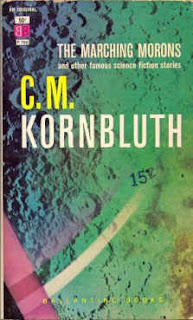
io9 recently asked six scientists to tell them what sci-fi books are the most accurate in their respective fields.
From the story...
David Barash, Evolutionary Psychologist, University of Washington:
I am hard-pressed to identify any sci-fi works that make use of evolutionary psychology directly, or even that fit neatly into its scientific world-view. Some possibilities include those books that have made use of the concept of selective breeding for particular behavioral inclinations: Dune comes to mind, and of course, before that, Brave New World.
Although evo-psych presumes genetic influence on behavior, it definitely doesn't imply anything like the genetic determinism found in either of these. In that sense, these books are more like a mis-use of evo-psych, likely to confirm the worst fears of readers who don't understand the science itself. Another case of this would be Margaret Atwood's The Handmaid's Tale, which derived from the author's mis-reading of what was then called sociobiology - specifically, her assumption that a science that examined male-female differences (among other things) was also prescribing and exaggerating these differences.
E-Readers Make People Want to, Go Figure, READ

Tech News Daily takes note a new study that on peoples' reading habits with all these new fangled reading devices out there.
From the story...
The survey looked specifically at e-readers and the iPad, asking participants: "Do you use an electronic reader device, such as a Kindle, an iPad or a Nook, to read books?"
Over half of people with e-readers, 53 percent, said they read more now than they did six months ago compared to 18 percent of non-e-reader users, according to The Harris Poll of 2,775 adults surveyed last month.
E-reader users are also more likely to buy books. Twenty percent of respondents without e-readers said they have not purchased any books in the past year compared with only eight percent of e-reader users who said the same.
How the Brontes Divide Humanity

The Guardian discusses Wuthering Heights people versus Jane Eyre people.
From the piece...
In Alison Flood's recent blog about the books she remembers most vividly from school, she mentioned that Jane Eyre bored her, but that the melodrama of Wuthering Heights kept her enthralled. This reminded me of my long-held pet theory about the Battle of the Brontës: everyone who's read both Jane Eyre and Wuthering Heights is passionately devoted to one book but nose-holdingly repelled by the other. If you want to be particularly contentious, you can divide those who satisfy the basic entry criteria into two types – those drawn to demure, bookish Miss Eyre and those for whom the pyrotechnical hanky-panky between Cathy Earnshaw and black-browed Heathcliff is paramount – and call them Librarians and Rock Stars. Alison is undoubtedly a Rock Star. I, on the other hand, am a Librarian.
A socially-inept only child, precociously devoted to solitary reading and with a wide-ranging, frequently pompous vocabulary, there was no way I wasn't going to adore Jane Eyre, the pale little scrap who introduced me to words like "moiety" and "redolent".
Sunday, September 26, 2010
The Muslim Comic Book Superhero

He's coming. It'll be a boy in a wheelchair with superpowers.
From the piece on the ABC News site...
U.S. philanthropist and businessman Jay T. Snyder says he was inspired by President Barack Obama's effort to reach out to the Muslim world in his January 2009 inaugural address. Last month, Snyder flew 12 disabled Americans to Damascus to meet a group of disabled young Syrians, and one of their main goals was to come up with ideas and story lines for the new superhero.
"The only limit was the imagination these kids had — the opportunity for a great story," said Snyder, a comic book collector who heads HBJ Investments LLC and whose non-profit organization, the Open Hands Initiative, financed the project. "They helped create something by their combined talents, and that becomes a gift to the world."
Aria Interested in Opera?

You should be!
NPR takes note of five books to ignite your passion for opera.
And speaking of opera, Comics Alliance takes note of some Portland area comics who went to the opera recently and sketched out some Pagliacci.
And speaking of Pagliacci:
Be Naughty - It's Banned Books Week
.jpg)
Read those books that make censors squirm. The New York Times offers ten ways to celebrate this week.
Paradise Lost and Paradise Found

Mediabistro takes note of a film helmed by Alex Proyas. He's planning on taking on John Milton's Paradise Lost.
And, talking about paradise, did Milton write sexual innuendo-laden poetry? The Guardian investigates.
Saturday, September 25, 2010
Flannery O'Connor's Peacocks: The Lives of Literary Pets

A Journey Around My Skull has a swell post about the pets of the literary elite (including Ernest Hemingway, William S. Burroughs and Edith Wharton).
Bowie & Burroughs

David Bowie and William S. Burroughs interviewed each other once for Rolling Stone. You can read it, here.
From the piece...
Burroughs: They try to categorize you. They want to see their picture of you and if they don't see their picture of you they're very upset. Writing is seeing how close you can come to make it happen, that's the object of all art. What else do they think man really wants, a whiskey priest on a mission he doesn't believe in? I think the most important thing in the world is that the artists should take over this planet because they're the only ones who can make anything happen. Why should we let these fucking newspaper politicians take over from us?
Bowie: I change my mind a lot. I usually don't agree with what I say very much. I'm an awful liar.
Burroughs: I am too.
Bowie: I'm not sure whether it is me changing my mind, or whether I lie a lot. It's somewhere between the two. I don't exactly lie, I change my mind all the time. People are always throwing things at me that I've said and I say that I didn't mean anything. You can't stand still on one point for your entire life.
Burroughs: Only politicians lay down what they think and that is it. Take a man like Hitler, he never changed his mind.
Here's Bowie in '73:
The Great Book Robbery
Palestine Note takes note of a new movie coming out documenting the looting of books and manuscripts from the 1984 Arab-Israeli War.
The trailer for the movie:
The trailer for the movie:
The Great Book Robbery (teaser) from Benny Brunner on Vimeo.
Notes on the Testicular and Penile Theories of Talent

Jackie Wang, for HTML Giant, has an entertaining essay about literary talent and gender.
From the story...
The winners of the Norman Mailer Nonfiction Writing Awards were just announced. A lucky college student will be now be $10,000 richer. Since the awards are intended to honor the legacy of Norman Mailer, now seems like an appropriate time to defame his name by remembering what a sexist asshole he was. Thinking about Norman Mailer’s legacy, I am reminded of the way in which he advanced what I call the Testicular Theory of Talent (TTT).
I remember when I was in high school, my friend read me a quote from Dali’s Diary of a Genius about how genius was only contained in the balls, which was a claim Dali used as a way of discouraging a woman—who was likely Amanda Lear—from being a painter. Later, I discovered that there is a whole discourse and articulated thread of ideas attributing talent and genius to the balls or the fluid that comes from the balls. Surprisingly, this discourse actually has a sprawling history. Galen, a medical researcher of Greek Antiquity—thought that seminal fluid contain the “vital spirit.” Teddy Roosevelt was paranoid about masturbating too much because he thought that loss of seminal fluid would trigger a loss of “nerve force”—the force that gives us “courage, ambition, personality, character, mental powers and energy” (Paul Von Boeckmann, 1921). Norman Mailer said that, “that a good novelist can do without everything but the remnant of his balls.” (Although, regarding another aspect of Mailer’s comment, I admit that maybe I am somewhat “dykily psychotic.”) Jodorowsky’s cinematic talent apparently sprung from his balls. Balls balls balls. Bad news for me, I guess. Good thing I’m not very invested in the concept of “genius” anyway.
At Steinbeck’s Getaway as Heirs’ Feud Revives
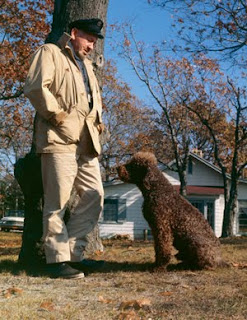
The New York Times discusses Steinbeck's Sag Harbor home, the 50th anniversary of his bestselling travel memoir, Travels with Charley, and the continuing feuds of his descendants.
From the piece...
The tall oaks described in the book are a half-century older, but still shading the expansive, grassy bluff. At the entrance to the kitchen remain the marks where Steinbeck recorded the height of each guest to the cottage, including the poodle, Charley. Japanese tourists show up in droves and lone looky-loos wander without permission, gawking at the writer’s shack where Steinbeck wrote “Travels” and other works, and at the quirky touches he left, like the statue of a unicorn.
But the house Steinbeck called “my little fishing place,” about a mile out of town, is part of a long-running and bitter family estate battle, pitting the surviving sister of the author’s third wife, Elaine, against his oldest son and a granddaughter. While the sister, Jean Boone, said she had decided against preserving the home as a historic site or museum because her family enjoyed vacationing there, the son, Thomas Steinbeck, said he could imagine the house as a writer’s school or haven but not a museum, saying his father would think that silly. It remains unclear who will be allowed to decide its future.
“The house belongs to Steinbeck’s blood heirs,” Thomas Steinbeck, 65, insisted in a telephone interview from his home in Santa Barbara, Calif.
Mrs. Boone, 81, insisted just as forcefully: “The house belongs to me. Elaine left it to me, and I’m leaving it to my family.” She said the property was left to her in a trust.
And so continues a family feud worthy of a Steinbeck novel.

For more on Steinbeck's time in Sag Harbor, I found this story in Hampton Style.
From that piece...
"I grow into this countryside with a lichen grip," John Steinbeck famously said about Sag Harbor, the place the novelist appears to have felt most at home. For the man who experienced lifelong restlessness, however, John Steinbeck's peace in Sag Harbor was to be equal parts hard-earned pleasure and crutch. In his personal life, Sag Harbor provided him with a full existence. He often sailed his boat, Fayre Eleyne, named for his beloved wife, Elaine, and lazed with his family in the ripe afternoons of late summer. Before writing in the morning, he liked to fraternize with the leathery, salt-caked fisherman, drinking coffee with them over their man's-man talk. It energized him to connect with the locals. John was much beloved by his neighbors here, and the affection was returned.
His adoptive home was the setting for both fictional New Baytown from The Winter of our Discontent and the starting and ending point of Travels with Charley, John's best-selling travelogue chronicling his cross-country voyage with canine companion Charley. He penned The Winter of Our Discontent in Joyous Garde, his studio overlooking the sea at their Bluff Point home, where the writer kept a stack of sharpened pencils in his hexagonal, supremely private work space. "I designed a cute little structure, six-sided, with windows looking in all directions ... It will look like a little lighthouse," beamed John, about the inception of his studio.
Friday, September 24, 2010
Kafka's Last Trial
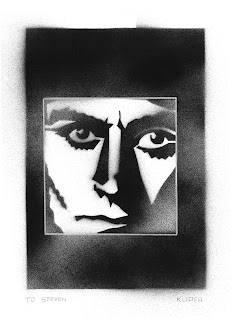
The New York Times has an interesting article about the life and afterlife of Kafka's writings.
From the piece...
During his lifetime, Franz Kafka burned an estimated 90 percent of his work. After his death at age 41, in 1924, a letter was discovered in his desk in Prague, addressed to his friend Max Brod. “Dearest Max,” it began. “My last request: Everything I leave behind me . . . in the way of diaries, manuscripts, letters (my own and others’), sketches and so on, to be burned unread.” Less than two months later, Brod, disregarding Kafka’s request, signed an agreement to prepare a posthumous edition of Kafka’s unpublished novels. “The Trial” came out in 1925, followed by “The Castle” (1926) and “Amerika” (1927). In 1939, carrying a suitcase stuffed with Kafka’s papers, Brod set out for Palestine on the last train to leave Prague, five minutes before the Nazis closed the Czech border. Thanks largely to Brod’s efforts, Kafka’s slim, enigmatic corpus was gradually recognized as one of the great monuments of 20th-century literature.
The contents of Brod’s suitcase, meanwhile, became subject to more than 50 years of legal wrangling. While about two-thirds of the Kafka estate eventually found its way to Oxford’s Bodleian Library, the remainder — believed to comprise drawings, travel diaries, letters and drafts — stayed in Brod’s possession until his death in Israel in 1968, when it passed to his secretary and presumed lover, Esther Hoffe. After Hoffe’s death in late 2007, at age 101, the National Library of Israel challenged the legality of her will, which bequeaths the materials to her two septuagenarian daughters, Eva Hoffe and Ruth Wiesler. The library is claiming a right to the papers under the terms of Brod’s will. The case has dragged on for more than two years. If the court finds in the sisters’ favor, they will be free to follow Eva’s stated plan to sell some or all of the papers to the German Literature Archive in Marbach. They will also be free to keep whatever they don’t sell in their multiple Swiss and Israeli bank vaults and in the Tel Aviv apartment that Eva shares with an untold number of cats.
The situation has repeatedly been called Kafkaesque, reflecting, perhaps, the strangeness of the idea that Kafka can be anyone’s private property. Isn’t that what Brod demonstrated, when he disregarded Kafka’s last testament: that Kafka’s works weren’t even Kafka’s private property but, rather, belonged to humanity?
Thursday, September 23, 2010
2010: The Year of the Newspaper Comic Strip
Comics Alliances takes note that it has been a record setting year for launching daily comic strips in newspapers.
From the piece...
While recent Direct Market sales of comic books have many writers, artists (and bloggers!) checking the nerd want-ads, the syndicated comic strip business seems to be chugging along just fine. Really, better than fine, at least according to a post at The Daily Cartoonist. No fewer than seven new comic strip features have or are to be launched in 2010 from the major newspaper strip syndicates, four more than last year, and a record at that.
The similarities and differences between daily strips and periodical comic books are obvious and much documented, but it's interesting to look at what sort of sequential art material earns widespread and presumably lucrative distribution -- is it relevant? Profound? Or is it something our grandparents would find really hilarious? -- while even the best comic books wear the scarlet number of $3.99 and fight for their lives in the perilous Direct Market.
The Age of Citation

What's the deal with all the epigraphs used in modern poetry? The New York Times investigates.
From the piece...
Consider Liz Waldner’s recent collection, “Trust.” First, we’re presented with epigraphs from Lewis Carroll and Karl Marx that are presumably meant to cover the book as a whole; then we have an epigraph from Samuel Johnson that’s meant to apply to Section 1; and finally, we have an epigraph from Plato’s “Symposium” in the first poem. So that’s four writers we’ve encountered before we’ve read one line from the author.
To be fair to Waldner, this tally is by no means unusual: a quick survey of recent collections on my bookshelf yields opening pronouncements from Wallace Stevens, Walter Benjamin, Shakespeare, Karl Marx (again), James Schuyler, Don DeLillo, Gertrude Stein, Chekhov, Ovid, Dickinson, Sappho, the Wu-men kuan, Theodore Roethke and the 18th-century art historian Johann Joachim Winckelmann. Randall Jarrell said his generation lived in the age of criticism; we apparently live in the age of citation.
Why is that? In part, our abundance of epigraphs is simply a function of poets doing what poets have always done. Chaucer opened “The Knight’s Tale” with a quotation from the Roman poet Statius; Alexander Pope began the 1743 version of the “Dunciad” with an epigraph from Ovid; and Keats prefaced his “Poems” with a quotation from Spenser (as well as a drawing of Shakespeare’s head). But while epigraphs have always been a part of poetic tradition, they do seem to be unusually thick on the ground these days, and not just in America — as the Canadian poet and critic Carmine Starnino wryly noted in the January issue of Poetry magazine: “Lately it seems no book of Canadian poetry can be put to bed without an epigraph to tuck it in.”
Wednesday, September 22, 2010
The Hardy Boys' Final Chapter
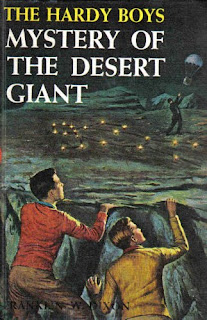
The Washington Post has an interesting story about the author of the Hardy Boys books, Franklin W. Dixon. The thing is, there was no Franklin W. Dixon.
From the piece...
In one sense, Franklin W. Dixon never existed. Franklin W. Dixon was a "house name," owned by a company called the Stratemeyer Syndicate, which created and published the original Hardy Boys. From 1927 through 1946 each Hardy Boys book was secretly written by a man named Leslie McFarlane.
I found myself, quite literally, chasing a ghost.
I caught up with him on the telephone, in the person of the ghostwriter's daughter, Norah Perez of Youngstown, N.Y. Perez is an accomplished novelist. Her father died in 1977.
Recently, Perez leafed through some old Hardy Boys books. "I was almost shocked," she said with a laugh. "I thought, omigod. They are not great."
So her father was a hack?
"My father," she said, "was a literate, sophisticated, erudite man."
He was?
He loved Dickens, she said. "He was a great Joycean."
He was?
"He corresponded with F. Scott Fitzgerald. He had aspirations to be that kind of writer."
She seemed uncertain where to go with this. Finally:
"He hated the Hardy Boys."
It turns out the story of the Hardy Boys -- call it their Final Chapter -- isn't about the worst writer who ever lived, not by a long shot. It is about a good writer who wrote some bad books, and if you wonder why that happened, as I did, then you are likely not very old and not very wise. Sometimes homely things are done for the best reasons in the world, and thus achieve a beauty of their own.
Two First Novels, Ten Years in the Making
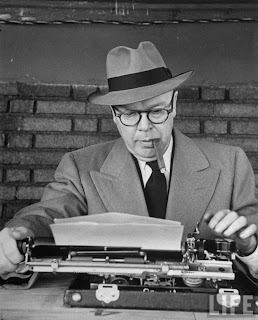
NPR, on Weekend Edition, recently discussed the writing process with newly published novelists.
From the piece...
The writing process is not for the faint of heart, says novelist and editor Colin Harrison. And he should know: His own first novel took five years to complete — and was then rejected by everybody. Fiction writing promises years of obscurity, little money and no guarantee that anyone will ever read what you write. But many fiction authors — Harrison included — keep at it.
"Although I didn't realize it at the time," Harrison says, "[Rejection] was a fantastic stroke of luck. Because that first novel that I had worked so hard on was terrible — it really was."
In Harrison's case, that first unpublishable novel served as a painful but valuable training exercise.
"[It] probably flushed a lot of writerly poisons out of my system," he explains. "And then I had to go on and start something new." That something new was Harrison's Break and Enter, the first of his seven wildly successful, published novels.
Though there is no formula for a successful first novel, the writers who make it through tend to be mulish, or obsessed with a single event or idea.
The Ol' Dead Dad Syndrome

Why are there so many dead parents in kid's books? That's the question posed recently in Publishers Weekly.
From the piece...
Dead parents are so much a part of middle-grade and teen fiction at this point, it's not even the "in" thing. It's not "au courant" or "en vogue." It's just an accepted fact: kids in books are parentless.
But I don't accept it, because you know what? It is not believable that so many kids are missing one, if not both parents. Slews of them! Hundreds! To quote Oscar Wilde, sort of: "To lose one parent may be regarded as a misfortune; to lose a parent in nearly every children's book looks like lazy writing." (I assume that is what Wilde meant.)
What's so lazy about writing in a deceased parent? I'll tell you.
First, a dead parent is one fewer character to have to write. At their hearts, most novels are the stories of characters' relationships with other characters. Combine Wilbur's relationships with Charlotte, with Templeton, and with Fern, and you more or less have Charlotte's Web.
But creating all those different relationships is hard work, because they are complex and ever shifting. Having established how a protagonist gets along with her best friend, boyfriend, ex-best friend, piano teacher, and ghost who lives in the cellar, who really wants to add her parents into the mix?
The Interviews in the Paris Review

They're now all free to read online (from Arthur Miller to Saul Bellow; Truman Capote to Woody Allen). Thanks, Paris Review!
Boxing Buddies

The New York Times reviews a book about an unlikely bond between boxing champ Gene Tunney and writer George Bernard Shaw.
Here's Tunney fighting:
Tuesday, September 21, 2010
Where the Boys Are Not

What does it mean when most of the publishing industry is female?
From the piece in Publishers Weekly...
It’s no secret that lots of women work in publishing. But just how many more women work in publishing than men? In PW’s recent Salary Survey (Aug. 2) one statistic stuck out: 85% of employees with less than three years of experience in the industry are women. So, while everyone knows there are more women than men working in this business, that statistic raises the question: is an almost all-female publishing industry bad for business? Does it matter?...
Others don’t see a problem with an industry that’s dominated by women. Retha Powers, assistant director of the publishing certificate program at CUNY (an undergraduate program), said she doesn’t think that 85% statistic is worrisome, noting that men and women will likely both struggle with getting men and boys to read. “I don’t think there’s potential for overlooking male readers because there’s always a focus on trying to get that elusive 18–35 male reader,” she said.
David Unger, who heads CUNY’s program, said he’s been noticing a few more men enrolling in the courses. He said that in the summer of 2009 only two of 12 students were men, but in the spring of 2010 three of eight students who did publishing internships were men. Unger said he thinks the numbers “ebb and flow” and that, possibly, as the job market tightens, and positions in fields like finance and technology become harder to get, more men may consider publishing.
Almost all those interviewed acknowledged that publishing does have hurdles to overcome in attracting men. The main impediment for attracting men, many think, is the low pay of publishing jobs, especially entry-level ones.
Lindy Hess, director of the graduate Columbia Publishing Course, said that publishing, like teaching, has been a field that’s traditionally been “more open” to women. Hess said she also assumes that there are more female English majors out there—which may be because women like to read more than men—and that’s reflected in the industry.
What Happens to Your Personal Library When You Die?
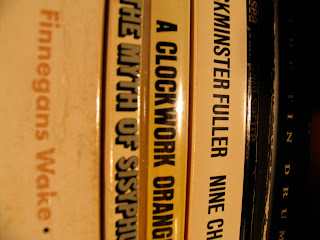
In the piece "Lost Libraries," the Boston Globe tracks the curious afterlives of a deceased author's books.
From the piece...
What Markson’s fans had stumbled on was the strange and disorienting world of authors’ personal libraries. Most people might imagine that authors’ libraries matter--that scholars and readers should care what books authors read, what they thought about them, what they scribbled in the margins. But far more libraries get dispersed than saved. In fact, David Markson can now take his place in a long and distinguished line of writers whose personal libraries were quickly, casually broken down. Herman Melville’s books? One bookstore bought an assortment for $120, then scrapped the theological titles for paper. Stephen Crane’s? His widow died a brothel madam, and her estate (and his books) were auctioned off on the steps of a Florida courthouse. Ernest Hemingway’s? To this day, all 9,000 titles remain trapped in his Cuban villa.
The issues at stake when libraries vanish are bigger than any one author and his books. An author’s library offers unique access to a mind at work, and their treatment provides a look at what exactly the literary world decides to value in an author’s life. John Wronoski, a longtime book dealer in Cambridge, has seen the libraries of many prestigious authors pass through his store without securing a permanent home. ”Most readers would see these names and think, ’My god, shouldn’t they be in a library?’” Wronoski says. ”But most readers have no idea how this system works.”
The literary world is full of treasures and talismans, not all of them especially literary--a lock of Byron’s hair has been sold at auction; Harvard has archived John Updike’s golf score cards.
For private collectors and university libraries, though, the most important targets are manuscripts and letters and research materials--what’s collectively known as an author’s papers--and rare, individually valuable books. In the first category, especially, things can get expensive. The University of Texas’s Harry Ransom Center recently bought Bob Woodward and Carl Bernstein’s papers for $5 million and Norman Mailer’s for $2.5 million. Compared to the papers, the author’s own library takes a back seat. ”An author’s books are important,” says Tom Staley, the Ransom Center’s director, ”but they’re no substitute for the manuscripts and the correspondence. The books are gravy.”
The State of the Graphic Novel

Robert Kirkman, partner at Image Comics, is interviewed by The Atlantic in regards to graphic novels.
From the piece...
If I were to ask a stranger for the definition of a graphic novel, they'd probably tell me that it's simply a comic book. Is there a clear distinction between the graphic novel and the conventional comic book?
I'm of the mind that comic book and graphic novel are interchangeable terms for the same thing these days. A graphic novel is a comic book which was simply intended to be read as one book and published as such. That definition would actually knock renowned graphic novels like Watchmen out of the running, since Watchmen began as a serialized monthly book that was eventually collected into a bound novel. Some people do "original graphic novels" that are one complete book. There are purists who say that Watchmen isn't an original graphic novel.
But yes, the term graphic novel is something that has risen in the public psyche as a better definition of a longer bundle of comic books. "Comic books" as we know them were originally based on comic strips from newspapers collected into books. But the graphic novel in the public mind is something a little different. We're doing novel-like stories that continue, a lot of books like "Wanted," a story with a beginning middle and end. I think. But then again, my book, The Walking Dead, is a monthly comic book series. This whole "trekkie/trekker" term is sort of senseless. I have friends who get annoyed when "The Walking Dead" is referred to as a graphic novel.
Monday, September 20, 2010
Jon's Writing on Venuszine
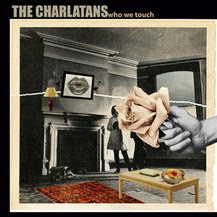
I had the pleasure of reviewing The Charlatans latest album for Venuszine, here.
Here they are singing a single off their latest:
A Truly Bookless Library

It exists. It's in San Antonio.
From a piece in Inside Higher Ed...
San Antonio says it now has the first actual bookless library. Students who stretch out in the library’s ample study spaces — which dominate the floor plan of the new building — and log on to its resource network using their laptops or the library’s 10 public computers will be able to access 425,000 e-books and 18,000 electronic journal articles. Librarians will have offices there and will be available for consultations.
Students used to get their engineering and technology books from a collection at the campus’s main library. That collection is still there, and books from it are available upon request. But at the new library dedicated to that specialty, the only dead trees are in the beams and furniture.
The fact that San Antonio has actually built a literal version of what many in the industry hold up as symbol of the inevitability of electronic as the prevailing medium in academe may be commendable, but it is not “earth-moving,” says Roger Schonfeld, the managing director of Ithaka S+R, a nonprofit that promotes innovation in libraries and elsewhere. Many libraries, especially science and engineering ones, have started moving their print volumes out of the building and into remote storage.
Get a Real Degree

Eli Batuman, for London Review of Books, takes a look at postwar fiction and the rise of the Creative Writing degree.
From the piece...
The most exhilarating pages of The Programme Era sketch a dialectic between Carver, the father of minimalism, and Joyce Carol Oates, the great graphomaniac who ‘during some periods of her career … has produced “40 to 50 pages [of fiction] each day” for a total of “well over 500 published stories, companion to the 40 or so novels and other books”’. While Carver’s stories are characterised by a ‘relative invisibility of racial self-consciousness’, Oates, it turns out, has always manifested guilt about ‘the unjust advantages of a white skin’. The heroine of I Lock My Door upon Myself, walking through a black neighbourhood, realises that the residents’ ‘immediate ancestors had been owned … Like me they are outcasts in this country. Not like me: they are true outcasts.’ In this persecution contest, the winner isn’t predetermined. Who is the real outcast? Oates literally dramatises the contest, which acquires the mesmerising, morbid fascination of a hot-dog eating contest between a human and a grizzly bear. Is the real outcast the professor’s grieving widow alone in the empty house in the college town, or the paranoid Bosnian graduate student threatened with deportation? Which estranged cousin is the real outcast: the German girl who survived Auschwitz and became a successful but caustic and solitary anthropology professor; or the American girl who narrowly avoided being murdered by her own father, then became a good wife and mother, but ended up getting cancer? Oates is the rare and admirable programme writer who never forgets that every unhappy family is unhappy after its own fashion.
The brilliant insight in McGurl’s chapter on Oates and Carver is the determining role played in their work by shame. Shame engenders both Carver’s taciturnity and Oates’s graphomania, which is really a compulsion to restage the outcasts contest, doing everyone justice, and constituting a proof that writing, too, is real work. I disagree with McGurl, however, that the shame shared by Oates and Carver is produced by the writing programme in particular, or school in general. ‘Shame and pride are the affective fuel of the school, the motive force of its everyday machinations,’ McGurl observes, plausibly enough – except that people were going to school for hundreds of years before the Iowa workshop. In his fascination with the GI Bill, McGurl occasionally conveys the impression that writers didn’t go to college before 1945, as when he draws our attention to
the seemingly banal fact that virtually all contemporary American fiction writers … have attended college … In previous generations this would not likely have been the case, both because fewer individuals of any kind went to college before the postwar advent of mass higher education and because a college education was not yet perceived as an obvious … starting point for a career as a novelist. Rather, as the uncredentialled, or rather press-credentialled, example of the high school graduate Hemingway makes clear, the key supplementary institution for the novel until mid-century was journalism.
The GI Bill dramatically increased the percentage of college-educated Americans, but did it really affect the percentage of college-educated American writers? According to the internet, writers have, in fact, been going to college for hundreds of years.[*] The claim that the GI Bill produced a generation of unprecedentedly shameful young people, meanwhile, is weakened by the fact that outsiders, from Balzac’s parvenus to Proletkult, have been joining the intelligentsia for nearly as long as there has been an intelligentsia to join.
To my mind, the real cause of shame here is the profession of writing, and it affects McGurl just as much as it does Carver and Oates. Literary writing is inherently elitist and impractical. It doesn’t directly cure disease, combat injustice, or make enough money, usually, to support philanthropic aims. Because writing is suspected to be narcissistic and wasteful, it must be ‘disciplined’ by the programme – as McGurl documents with a 1941 promotional photo of Paul Engle, then director of the Iowa workshop, seated at a desk with a typewriter and a large whip.
Retailers Speak Up about Falling Comic Book Sales

A lot of comic books now carry a price tag of $3.99. That is hurting sales.
From a piece in Comics Alliance...
Adam Healy, Cosmic Monkey Comics, Portland:
"We've seen price increases before during certain crises, but never a full third, and with no justification. It's phenomenal, and it's indefensible. When they raise the prices, that directly impacts our ability to stock the shelves and showcase what's out there, because we're only working with so much money... Whatever money we've made from the price increase, we've lost from the extra books we've had to pick up that we didn't sell.
Marvel is currently publishing what everyone else puts out as a $2.99 comic for $3.99, but with no added value. The first monthly book [at $3.99] with no added value was "Dark Avengers," and that's when we started to get nervous about because we realized all our unsold copies were going to cost us more money. At first it didn't seem to hurt sales because people were really excited about it, but now across the board, we've seen the sales for every $3.99 book go down, except for "Hulk" and "Thor." A lot of companies are only printing to order too, so if we sell out we can't reorder the last month's issue, which means we can't grow a lot of things.
Can a Woman Be a "Great American Novelist"?

That's the question posed by Slate.
From the piece...
A thought exercise, perhaps specious: If this book had been written by a woman (say, Jennifer Franzen), would it have been called "a masterpiece of American fiction" in the first line of its front-page New York Times review; would its author, perhaps with longer hair and make-up, have been featured in Time as a GREAT AMERICAN NOVELIST; would the Guardian have called it the "Book of the Century"? Without detracting from Franzen, I think we can say it would not have received this trifecta of plaudits, largely because we don't ascribe literary authority as freely to women as men, and our models of literary greatness remain primarily male (and white). Of course, there are the always-pointed-out exceptions: Marilynne Robinson and Toni Morrison, whose Beloved topped the New York Times list of the best books of the past 25 years. So is there really a problem here?
There is, I think, and we might call it not the problem with no name but the problem we can't define: the problem of unconscious gender bias and how it affects the ways we think about accomplishment and authority. It hardly seems like a coincidence that when a generation of celebrated novelists dies out (Bellow, Mailer, Updike), the new ones anointed are typically white men. (When Zadie Smith—whose work occupies a similar literary space to Franzen's, at once engaged by the domestic and the social—is on the cover of the Times and Time, perhaps women writers can start to feel differently.) Myriad studies show that women and men alike unconsciously ascribe more authority to a male candidate than a female candidate with the same qualifications. In many circumstances, we also simply assume men are more talented: Before the advent of blind auditions, fewer than 5 percent of the players in major American symphonies were women. But after blind auditions began to be held, the percentage of female players soared almost tenfold. Is there any reason to believe our evaluations of literary talent (which almost always happen with full knowledge of a writer's gender) are uninfluenced by that kind of unconscious bias?
Sunday, September 19, 2010
Subscribe to:
Posts (Atom)














